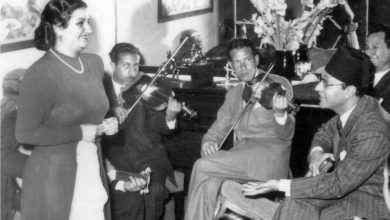
I was listening to a lecture in English by German researcher Angelika Neufirt, presented at the Ismaili Studies Center at Aga Khan University in London this year, on the literary lesson of the Quran, and I was thinking about the lack of interest in the school of Sheikh Amin al-Khouli at Fouad I University in studying the subject. In all the lectures I have heard her give on literary studies, she makes no reference to these efforts.
At one point in the lecture, she mentioned the name Nasr Hamid Abu Zayd, pronouncing it in the Egyptian dialect rather than in the standard Arabic.
Abuzid prepared the last episode of Al-Khouli’s school for literary study of the Holy Quran, a school that was fought against in the 1940s and whose efforts were eliminated in the Arabic Language Department at the Faculty of Arts in Cairo. Nasr’s studies in the 1970s and 1980s were a revival of this school.
All this comes together in July, which marks a decade and a half since Nasr Abu Zeid’s passing. But 2025 marks three decades since an Egyptian appeals court ruled to separate Nasr Abu Zeid from his wife, Dr. Ibtihal Younis, a case that was rejected by a lower court but accepted by an appeals court, which upheld the ruling. The execution of the ruling was suspended and the Court of Cassation upheld the ruling.
The ordeal of not being promoted
The collapse of the Eastern Bloc/Communism at the end of the 1980s and the wave of violence generated by groups returning from jihad in Afghanistan after the Soviet withdrawal were a catalyst for religious currents. There were also debates and intellectual confrontations between the “Islamist” current
and those of the “civil/secular” movement. The confrontations took many forms. There was a state of intellectual and political tension.
At the end of 1991, an Egyptian state security court sentenced writer Alaa Hamed to eight years in prison following a report by the Islamic Research Academy on a novel. An attempt was made to confiscate the books of advisor Saeed Al-Ashmawi by an Al-Azhar committee at the Cairo Book Fair.
The famous debate at the fair was entitled “Egypt between the religious state and the civil state,” in which Dr. Mohamed Ahmed Khalafallah and Dr. Farag Foda participated as representatives of the civil movement, along with Sheikh Mohamed al-Ghazali, deputy general guide of the Muslim Brotherhood, and Dr. Mohamed Amara. The debate was moderated by Dr. Samir Sarhan, head of the General Book Authority. A state of tension between two intellectual currents in cultural life.
***
On May 9, 1992, Dr. Nasr Abu Zeid submitted a scientific paper to the Standing Committee for the Promotion of Professors of Arabic Language Departments in Egyptian Universities. A month later, writer Faraj Foda was assassinated outside his office. On the 28th of the month, the committee distributed the works to three professors:
Dr. Shawqi Daif (1910-2005), head of the promotion committee; Dr. Mahmoud Ali Makki (1929-2013); and Dr. Awni Abdel Raouf (1929-2020). Each was to submit a report on the works within three months. On October 22, Dr. Shawki Daif apologized for health reasons and withdrew from the work evaluation committee, and Dr. Abdul Saboor Shaheen (1929-2010) took his place.
The Promotion Committee met on December 3, and Dr. Mahmoud Ali Makki presented a report on the work, acknowledging the applicant’s eligibility for the rank of professor. Dr. Awni Abdel Raouf’s report also recommended the applicant’s eligibility for the rank of professor, while the third report, by Dr. Abdel Sabour Shahin, recommended that the applicant’s work did not qualify him for the rank of professor. The vote was taken, and seven members of the committee voted in favor of Nasr Abu Zeid’s eligibility for the professorship, despite the fact that there were two reports in his favor and only one against him.
The professors of the Arabic Language Department at the Faculty of Arts in Cairo met on December 7 to discuss the committee’s report, and the twelve professors who attended the meeting rejected the committee’s decision. They wrote a report recommending Nasr Abu Zeid for the rank of professor, which was submitted to the Faculty Council of the Faculty of Arts in Cairo.
***
At the faculty council meeting on December 9, a committee was formed comprising Dr. Mustafa Suweif (1924-2016), Dr. Abdel Aziz Hamouda (1937-2006),
Dr. Hassan Hanafi (1935-2021), and Dr. Jaber Asfour (1944-2021). The committee wrote a report responding to the promotions committee’s report, which was unanimously approved by the faculty council. It was sent to the president of Cairo University.
Professor Fahmi Huwaidi referred to the issue of non-promotion in his weekly article in Al-Ahram newspaper on December 26, 1992, in the context of a dispute between him and Nasr Abu Zeid over Abu Zeid’s introduction to the translation of the book Voice of the South.
The issue was shelved by the university council. Negotiations took place between the university presidency and Nasr Abu Zeid, agreeing that he would not be promoted this year but would be promoted next year, as there was no point in promoting him and then having him assassinated or stabbed. At an emergency meeting of the university’s Khartoum branch on March 18, 1993, the university council approved the principle of relying on the reports of scientific committees, even though the decision had always been the council’s.
***
The issue of non-promotion exploded in the Egyptian press:
- Fahmi Huwaidi wrote on March 23, 1993, in Al-Ahram newspaper, proposing the creation of safe intellectual zones that would not be subject to research and debate.
- Rozalyusuf magazine wrote on March 29, 1993, about the promotion being blocked.
- Al-Akhbar newspaper published a report by Abla al-Rouini entitled “Crisis at Cairo University.”
- Jamal al-Ghitani wrote his column “The Case of Dr. Nasr.”
- Farida al-Naqqash wrote in Al-Ahali newspaper: “Terrorism excommunicates a professor.”
- Ghali Shukri wrote about the case in his weekly column in Al-Ahram.
- On Friday, April 2, Al-Musawwar magazine published an investigation by Helmy al-Namnam entitled “Battle at Cairo University over Abu Zeid’s Promotion.”
In his weekly sermon at the Amr ibn al-As Mosque, the first mosque in Africa, Sheikh Dr. Abdul Sabour Shahin, professor at Dar al-Ulum and member of the Standing Committee for Promotions, addressed the issue.
Professor Lutfi al-Khouli wrote a full-page article in Al-Ahram newspaper entitled: “Cairo University and the Writers of Our Master,” and opened the weekly national dialogue page he oversees in the newspaper to the issue, publishing the three scientific reports from the Promotion Committee and opening the page for comments. Al-Qahira magazine also published a complete file containing all the reports.

The ordeal of the case of separation between the spouses
Lawyer Mohamed Samida Abdel Samad, a former advisor to the State Council, and a group of lawyers: Abdul Fattah Abdel Salam Al-Shahid, Ahmed Abdel Fattah Ahmed, Hisham Mustafa Hamza, Osama Al-Sayed Bayoumi, Abdul Muttalib Mohamed Ahmed, and Al-Morsi Al-Morsi Al-Hamidi, all from the office of Mohamed Samida Abdel Samad, with their headquarters at 33 Arab League Street in Mohandessin, Giza.
They filed a case to separate Dr. Nasr Abu Zeid and his wife, a professor at Cairo University, before the Giza Court of First Instance in the Personal Status Division, claiming that there were scholars who said that he had left Islam and that it was not permissible for a Muslim woman to be married to a non-Muslim, and that it was a case of Hisba in defense of the rights of God, on Monday, May 17, 1993.
During this period, the case of the assassination of Farag Foda was being heard, and in September there was an attempt to assassinate the Egyptian prime minister and the Egyptian minister of information.
The lawsuit was based on the distinction between freedom of belief and the legal consequences of that belief. The second part of the lawsuit argued that Hisbah was defending one of God’s rights, which benefit all people, not specific individuals.
***
The lawsuit raises another legal question: Is hisba legally valid or has it been abolished? There was a hisba judge in the 19th century, but with the introduction of modern legislation, civil courts, and laws regulating procedures, no provisions were made to regulate hisba, nor were any texts issued stating that hisba had been abolished.
Dr. Nasr’s defense team focused on the formal aspect, arguing that in order for a court to rule on separation, it must rule on the husband’s apostasy. and that neither Egyptian law nor the regulations governing the Sharia courts allow any court to rule on the Islam, apostasy, or conversion of a citizen, and that the separation rulings issued by the courts were in cases of apostasy that were proven beyond doubt, with evidence in official documents, such as in the case of a Christian who converted to Islam and then returned to Christianity, as documented in his identity card.
The other argument is that the plaintiffs have no legal standing to file the lawsuit because they did not suffer any personal harm, meaning that the request for divorce is the right of the person who suffered the harm, which in this case is Dr. Nasr’s wife.
***
On Thursday, January 17, 1994, the court was presided over by Judge Muhammad Awadallah, with Judges Muhammad Jundi and Mahmoud Saleh and Deputy Attorney General Wael Abdullah as members. The Personal Status Court of First Instance ruled to dismiss the case and refused to separate Dr. Nasr Abu Zeid and his wife, Dr. Ibtihal Younis.
The court based its rejection on the fact that when the Sharia courts were abolished, a distinction was made between the substantive rules and the procedural rules governing personal status in the former Sharia courts, and that the procedures became subject to the Code of Procedure, which was issued in 1968. This law did not regulate the procedures for a case brought before the Sharia court. The law also stipulated that no lawsuit would be accepted unless the plaintiff had a legitimate interest recognized by law, and that this interest must be direct.
The other part on which the court based its ruling was that the text of Article 2 of the Egyptian Constitution, which refers to the principles of Islamic law as the main source of legislation, is addressed to the legislature through the legislative councils and is not intended to be applied directly by judges without the issuance of legislation regulating the matter. The court therefore ruled that the claim for separation was inadmissible and ordered the plaintiffs to pay the costs.
The case in the Court of Appeal
The lawyer appealed the ruling of the Court of First Instance on February 10, 1994, before the Court of Appeal, which heard the case on July 24, 1994. The ruling was issued a year later, in July 1995.
The appeal ruling was based on the fact that the ruling of the court of first instance was a ruling on the subject matter of the case relating to the origin of the right to bring the action, and that it had therefore taken a position, thereby exhausting its jurisdiction and the case could not be referred back to it for consideration of its substance. The Court of Appeal would rule on the substance of the case. The court has jurisdiction to examine whether apostasy has occurred in order to be able to rule on the separation of a couple due to the apostasy of one of them. However, the court distinguished between belief, which is internal to the individual, and apostasy, which has an external existence.
***
Another point raised by the case is whether the Hisba exists and whether it has become the jurisdiction of the Public Prosecution or whether it has been abolished.
Therefore, the Court of Appeal ruled that the Public Prosecution Service should have stated in its pleadings whether it considered the writings of Nasr Abu Zeid, the appellant, to constitute apostasy or not, and to explain its reasons. The Public Prosecution did not do this. Accordingly, the court accepted the appeal in the case and ruled to separate Nasr Abu Zeid from his wife, Dr. Ibtihal Younis. However, the execution of the court’s ruling was suspended by the Attorney General because there are no procedures in the Code of Procedure for how to execute such a ruling. The separation ruling was suspended and the apostasy ruling remained in force.
***
Nasr Abu Zeid’s lawyers, as well as the public prosecutor, appealed the appeal court’s ruling before the Court of Cassation.
The appeal ruling came as a surprise to the government, which sought to amend the Code of Criminal Procedure, which was approved in May 1996, recognizing the existence of the Hisba, but making it the jurisdiction of the public prosecutor’s office, with the courts required to refer all cases brought before them on the basis of the Hisba that had not been finally decided to the public prosecutor’s office on their own initiative.
The government believed that these measures had put an end to the issue of the segregation ruling.
Nasr Abu Zeid’s lawyers filed a request with the Court of Cassation to reopen the case so that their client could benefit from the change in the law. The court extended the deadline for its ruling to August 5, 1996, and refused to reopen the case for the defense to present its arguments.
The court upheld the segregation ruling, ruling that Nasr Abu Zeid could not benefit from the change in the law because the court had reserved the case for judgment before the law was changed. The role of the Court of Cassation is limited to reviewing the judgment and not to deciding on the merits of the case.
***
Since that moment three decades ago, it is as if time has stood still. We are still standing in the middle of the road to modernization, where the old and the new coexist. The law exists but is not enforced, and the ruling on apostasy and separation has been issued but is suspended because there are no procedures for its implementation. A decade and a half after Nasr Abu Zayd’s death, the literary study of the Holy Quran in Egypt remains at a standstill at Cairo University. But can efforts from Germany and the Faculty of Arabic at Al-Azhar University revive it after it was halted at Cairo University’s Faculty of Arts?





Hi, this is a comment.
To get started with moderating, editing, and deleting comments, please visit the Comments screen in the dashboard.